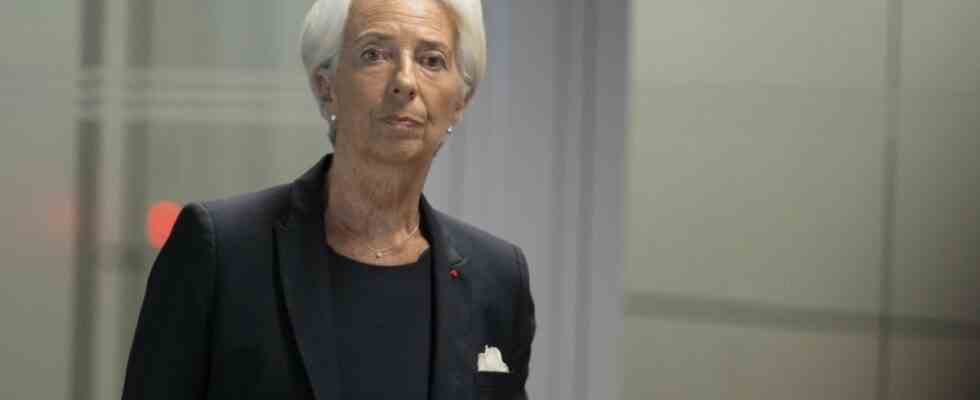Christine Lagarde has the French Saturday Supplement Madame Figaro recently gave an interview about women’s rights, environmental policy, Ukraine and her great responsibility as ECB President – but one topic was missing: monetary policy and the question of how she intends to combat the record high inflation in the euro zone. You don’t have to overstate the omission, but it shows that Lagarde probably prefers to talk about other topics right now.
At the same time, many people are currently only plagued by one thing: the high prices, which the central bank’s core business is to combat. In August, the inflation rate in the euro zone was 9.1 percent. That was another record value for the monetary union. Some experts expect inflation to be in double digits this year due to energy shortages. In this situation, the central bank should tighten monetary policy.
Therefore, some observers were surprised that Lagarde had said nothing about further interest rate hikes in the past summer weeks and had also stayed away from the renowned central bankers’ meeting in Jackson Hole, America. Instead, the German ECB director, Isabel Schnabel, warned of the impending loss of public confidence if inflation was not fought with “strong determination”.
On Thursday, the Governing Council of the ECB will decide on further tightening of the money supply. The monetary authorities are expected to raise interest rates by at least 0.5, if not 0.75 percentage points. In July, the central bank raised the key interest rate for the first time in eleven years – by half a percentage point. At the same time, it ended the bond-buying program in order to stop bringing cheap money to the market. Nevertheless, the ECB reinvests the proceeds from maturing bonds in the market.
The ECB initiated the turnaround in interest rates very late compared to other central banks. For a long time, Europe’s currency watchdogs assumed that the surge in inflation was temporary. It is now considered certain that price increases in the euro zone will be well above the target of two percent next year. In addition, it usually takes 12 to 18 months before interest rate increases take effect, i.e. before demand is reduced so much that the price level stabilizes. At the same time, the central bank promises citizens on its website: “We ensure stable prices and safe money.” If high inflation continues for one or more years, trust in the institution will be at stake, because households with low incomes in particular have to fear for their existence in view of the massive increase in the cost of living.
The ECB itself admits errors in its forecasts
Of course, the ECB is not responsible for the turmoil on the energy markets. But their penetrating unwillingness to take the risk of inflation more seriously last year reinforced the fatal impression that the central bankers were using the wrong analysis tools – the monetary watchdogs themselves now admit this. “We found that we know a lot less about the drivers of inflation than we thought,” Belgian central bank governor Pierre Wunsch said recently.
The ECB would like to eliminate this mistake and work less with forecasts in the future. Rather, the interest rate policy “is to be determined from meeting to meeting,” according to chief economist Philip Lane. So far, the ECB has worked with modeled two-year forecasts, at the end of which the inflation target of two percent has always been mathematically achieved. But the world is not a laboratory. “It is urgently necessary for the ECB Council to act decisively at its next meeting to combat inflation,” demands Bundesbank President Joachim Nagel, who expects further interest rate hikes in the coming months. Meanwhile, politicians fear that rising interest rates could stall the economy too much. The tightening of monetary policy “must be brought into line with the economic recovery path of Europe and Spain,” said Spain’s Prime Minister Pedro Sánchez.
Rising inflation is a huge problem in all leading industrialized countries except Japan. On the one hand, the country is considered a special case because prices there have practically not risen for two decades. In the meantime, they are also increasing there, but “only” by almost three percent. The inflation rate there is nowhere near as high as in Europe, the USA or Great Britain. The reasons?
Luxury business in Tokyo: In Japan, prices have not risen as much as in Europe.
(Photo: imago stock&people)
“For a long time, the Bank of Japan has made sure that interest rates in Japan are below those in the United States. This has resulted in an average annual net outflow of around 130 billion dollars from Japan since 1990,” says Gunther Schnabl, an economist at the University of Leipzig. Investor money usually goes to places where interest rates are higher, which is why inflation falls because: “When capital flows out, it can neither be consumed in one’s own country nor given out as credit. This dampened inflationary pressure.” In addition, Japan has subsidized the prices of many goods, using money from the state treasury to keep prices artificially low. The government borrowed this money from the central bank, which has long been criticized by experts.
Today one can learn from Japan, says Schnabl. The governments are required. “Inflation control through forward-looking subsidy policies has worked there over the last 20 years.” In Europe, this only started with the rise in inflation in the second half of 2021. In France, for example, with a price cap on energy, in Hungary with milk price subsidies or in Germany with a reduction in the energy tax for fuel. “However, the long phase of low or even falling prices also led to a loss of prosperity among the Japanese population, for example due to falling wages and low interest rates on savings,” says the economist. “But that was a gradual process. In Europe, the loss of prosperity with the surge in inflation is much more abrupt.”

